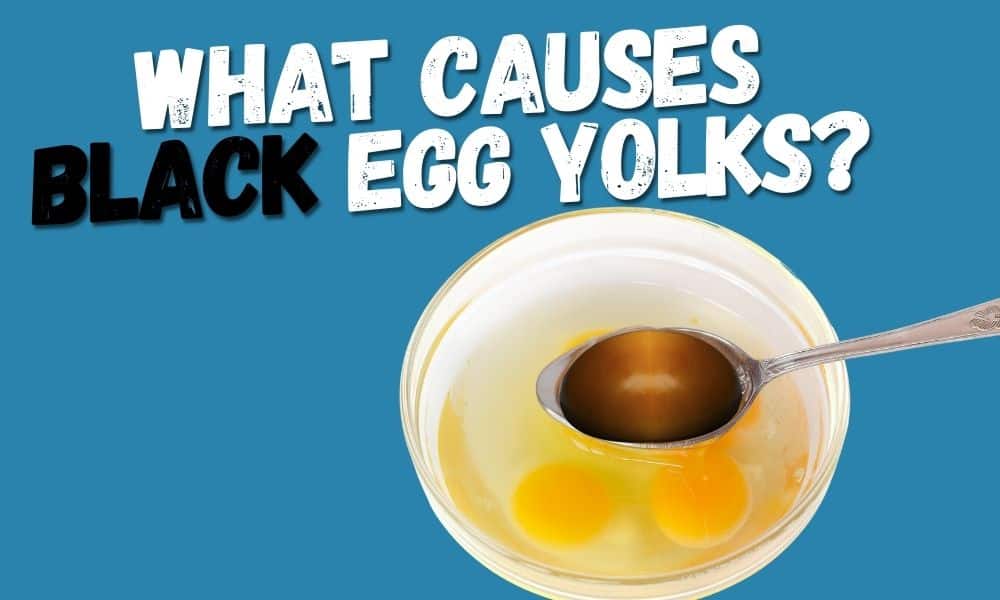Sure, we’re all used to seeing normal egg yolks, ranging from dark orange to pale yellow color.
So when you see an egg yolk that’s out of the ordinary, it’s pretty easy to tell something ain’t right.
If you’re here, you’ve either experienced firsthand the shock of a black egg yolk, or you’ve heard some horror stories that you’re wanting an explanation for!
Here we go through the phenomenon of black egg yolks, what causes the yolk to go black, and what it means.
Contents
Black Egg Yolks?
Were you minding your own business, preparing to cook some eggs only to crack into one to find a distinctly black egg yolk?
That’s right, you’re not dreaming – egg yolks can develop a dark black or gray color. In fact, it’s a clear sign that your egg has spoiled and has gone bad!
In saying that, if you see a presence of greenish-gray or black shades in a COOKED egg yolk (like in hard-boiled eggs) it may simply be a result of overcooking!
The distinction between the two is that if a RAW egg yolk is black it’s a sign that it’s spoiled and is unsafe to consume, but if it only turned black after it’s COOKED, then it could simply be a sign of overcooking.
What Causes Black Egg Yolks?

A black egg yolk is most often caused by decomposition, brought on by bacterial or fungus growth. That’s a rotten egg.
The bacteria and fungus break down the proteins in the yolk. During this process, the yellow and orange pigment in the yolk is replaced with a dark black color.
Though, there is a separate process that occurs when you cook eggs for too long or at too high a temperature. In these situations, a dark greenish-greyish color can be produced from the combining of the hydrogen in the egg white and the sulfur in the egg yolk.
How To Tell If Your Egg Is Bad
So how can you if your egg is rotten or simply overcooked?
Well, for one thing, there’s the smell!
Really though, if your black egg yolk is rotten you will normally smell a pungent “eggy” sulfur smell – even before it’s cooked!
Aside from this, you can be certain you’ve got a rotten egg if it was black even as a raw yolk!
Is It Safe To Eat Black Egg Yolk?
You should never attempt to eat or cook a rotten egg. Ever.
If your egg yolk is black before it’s cooked, then it’s almost a certainty that it’s spoiled and should be discarded.
The only times it’s safe to eat an egg that has a black egg yolk is if it’s simply been overcooked. In these instances, there will only be a little bit of black or green around the yolk.
However, if you’ve hard-boiled your eggs, then you can’t always be sure if it’s rotten or simply overcooked.
Although you should smell a distinct “off” flavor from any rotten eggs, if you’re uncertain then it’s best to be on the safe side and discard the egg!
How To Prevent Eggs From Going Bad
You’ll hear and read all sorts of old wives’ tales about how to store eggs properly. But, the clear similarity amongst all the different tactics is to store them in a cool, dry, place, out of the way of any other contaminants.
To prevent your eggs from going bad you should:
- Collect your eggs daily from your coop (if raising your own chickens!)
- Store your eggs in a dry, safe place inside or outside the fridge.
- Consume your eggs within a month if stored outside the fridge or within 3 months if stored with a fridge.
FYI, you do not need to wash your eggs!
Can Chickens Lay Eggs With Black Egg Yolks?
You may be wondering whether it’s possible for chickens to actually lay an egg with a black egg yolk – especially if you’ve cracked open what was thought to be a fresh egg!
Although I’m not denying that it’s possible, almost always a black egg yolk will be caused by rot occurring AFTER it’s been laid.
So there’s no need to start stressing that something wrong with your chickens!
Quick Summary
If you’ve found a black egg yolk in a raw egg, then chances are it’s simply gone off and started to rot.
If you’ve found your egg yolk is a little black, green, or gray only AFTER it’s been cooked, then it’s probable that it’s simply been overcooked.
Still, it’s always better to be safe than sorry: if in doubt, just throw it out!
